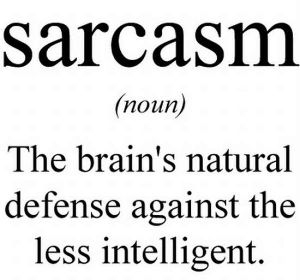
The definition of irony and sarcasm is often confusing one and many believe the two to be same, but both are not and yet not distinct either in today’s usage. This is general philosophy.
It is not to forget sarcasm often has a component of irony in it even though irony encompasses a larger range of linguistic situations.
Irony is a condition of events or affairs of a character opposite to what was expected. It can be in a cosmic fashion or else in a historic one too like New York Times newspaper today is most widely identified with the crossword puzzles which it used to mock in the 1920s.
Sarcasm on the other hand is used harshly and also often crudely for destructive purposes. It is an insincere form of politeness to offend other. Sarcasm requires intention and is termed as overt irony in the form of verbal aggression.
William Brant once wrote, “Sarcasm is hypothesized to develop as a cognitive and emotional tool that adolescents use in order to test the borders of politeness and truth in conversation.”
However, Dostoyevsky defended it by saying sarcasm is in fact like the last refuge of modest people when privacy of soul is intrusively invaded.
It is also debated lately like attacking by way of humor should be protected by the law. In such case here it is not to forget the sarcastic satire magazine Charlie Hebdo that attacks through cartoons.


